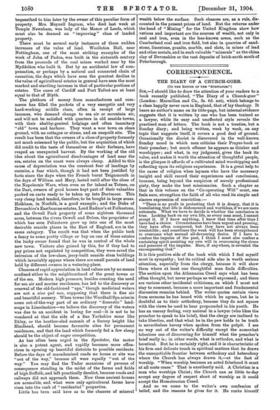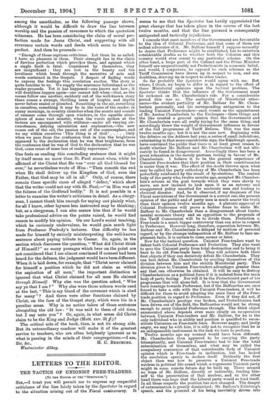THE DIARY OF A CHURCH-GOER.
[TO THE EDITOR OF THE "SPEETATOR."1
should like to draw the attention of your readers to a book recently published, "The Diary of a Church-goer" (London : Macmillan and Co., 3s. 6d. net), which belongs to a class happily never rare in England, that of lay theology. It bears no author's name on its title-page, but internal evidence suggests that it is written by one who has been trained as a lawyer, while its easy and unaffected style reveals the practised man of letters. The book is not a treatise, but a Sunday diary ; and being written, week by week, on any topic that suggests itself, it covers a good deal of ground. Occasionally the diarist is discovered in the well-known Sunday mood in which men criticise their Prayer-book or their preacher; but much oftener he appears as thinker and worshipper ; and what, in ray judgment, gives the book its value, and makes it worth the attention of thoughtful people, is the glimpse it affords of a cultivated mind worshipping and reflecting upon its religious experiences. It is a great help to the cause of religion when laymen who have the necessary insight and skill record their experiences and conclusions, because, being beyond the suspicion of merely professional piety, they make the best missionaries. Such a chapter as that in this volume on the "Co-operating Will" must, one feels sure, strengthen the faith of all who read its simple and sincere expression of conviction :—
"There is no profit in protesting that it is dreary, that it is humiliating, that life is dishonoured and worthless, if we are mere automata. What we have to decide is whether the conclusion is true. Looking back on my own life, as every man must, I cannot accept it. If I know anything, I know that time after time I have had a choice. Circumstances have been urgent and pressing, they have often conquered, but they have not always been irresistible ; and sometimes the weak will has been strengthened to overcome what seemed all-devouring desire. If I have to confess the impulse of the past, I think I must also confess a sustaining spirit assisting my own will in overcoming the stress and pressure of the impulse. Here, if anywhere, is revealed the encompassing God."
It is this positive side of the book with which I feel myself most in sympathy ; but its critical side also is worth serious
attention, especially from the clergy, because it will show them where at least one thoughtful man finds difficulties. The section upon the Athanasian Creed says what has been often thought, but never perhaps so well expressed; and there are various other incidental criticisms, on which I must not stay to comment, because a more important and fundamental discussion remains behind. The writer quotes certain views from sermons he has heard with which he agrees, but he is doubtful as to their orthodoxy, because they do not square with the views he used to hear propounded in his youth. He has an uneasy feeling, very natural in a lawyer (who likes the preacher to speak to his brief), that the clergy are inclined to take liberties, and that what he in the pew holds to be truth is nevertheless heresy when spoken from the pulpit. I see no way out of the writer's difficulty except the somewhat laborious one of discovering for himself what the preacher's brief really is ; in other words, what is orthodox, and what is heretical. But he is certainly right, and it is characteristic of his firm and delicate touch in spiritual matters that he draws the unnegotiable frontier between orthodoxy and heterodoxy where the Church has always drawn it,—at the fact of worship. "When worship becomes an acted falsehood it must at all costs cease." That is excellently said. A Christian is a man who worships Christ; the Church can as little to-day accept any degree of respect short of worship as it could accept the Homoiousian Creed.
And so we come to the writer's own confession of belief, and the reasons he gives for it. He ranks himself
witnesses. He has been considering the claim of moral per: fection made for Jesus Christ, and suggesting with all reverence certain words and deeds which seem to him im- perfect. And then he proceeds :— " Enough of these captious criticisms. Let them be so called. I have no pleasure in them. Their strength lies in the claim of flawless perfection which provokes them, and against which a. single fault is fatal. Considered by themselves, they are insignificant : they are lost in the beauty and the loveliness which break through the narrative of acts and words contained in the Gospels. I despair of finding words to express the feelings this revelation excites. The story is quite familiar to us. We supply the sentences beforehand as the reader proceeds. Yet it has happened—one knows not how ; it will doubtless happen again—one cannot tell when—that, as the verses follow one another, suddenly out of the well-known story there comes a strange, thrilling sense of heights and depths never before scaled or plumbed. Something in the air, something in ourselves, something it may be in the voice of the reader, in sunny mornings, in country churches when the scents and sounds of summer come through open windows, in the equable atmo- sphere of some vast minster, when the words spoken at the lectern are encompassed with stillness—under all varying cir- cumstances, defying calculation and explanation,—the new comes out of the old, the passion out of the commonplace, and
we say within ourselves "Phis thing is of God.' Only when we pass from the confession that in him the brightness appeared to the declaration that he was that brightness, from the confession that he was of God to the declaration that he was God, some sense of some loss of reality supervenes."
One feels on reading this concluding sentence that it might by itself mean no more than St. Paul meant when, while he affirmed of the Christ that He was "over all God blessed for ever," he nevertheless wrote of Him : "Then cometh the end when He shall deliver up the Kingdom of God, even the Father, that God may be all in all." Only, of course, there remain these specific cases of alleged " defect," which show that the writer could not say with St. Paul,—" in Him was all the fulness of the Godhead bodily." • It is not possible in a letter to examine the writer's criticisms in detail. As a clergy- man, I cannot thank him enough for saying out plainly what, for at I know, other laymen less instructed may be thinking; but, as a clergyman, I can also assure him that if he would take professional advice on the points raised, he would find reason to modify his opinion. On our Lord's social teaching, which he curiously undervalues, he would gain much light from Professor Peabody's lectures. One difficulty he has made for himself by entirely misinterpreting the well-known sentence about paying tribute to Caesar. So, again, in the section which discusses the question, "What did Christ think of Himself?" so many passages which bear on the point are not considered that I am almost convinced if counsel had been heard for the defence, the judgment would have been different. When it is laid down, for example, that "Christ never claimed
for himself a position which he did not claim as within the aspiration of all men," the important distinction is ignored that what Christ claimed for all men He claimed through Himself. Why else was the question asked, "Who
say ye that I am ? " Why else were those solemn words used at the last, "This is my blood of the covenant which is shed for many " ? And there were other functions claimed by
Christ, on the face of the Gospel story, which were his in a peculiar sense. Why is no notice taken of those sentences abrogating the old law : "It was said to them of old time, but I say unto you" ? Or, again, in what sense did Christ claim to be the King and Judge (Matt. xxv. 31 ff.)?
The critical side of the book, then, is not its strong side. But its extraordinary candour will make it of the greatest service to teachers, who are often helplessly ignorant as to what is passing in the minds of their congregations.—I am, Sir, &c., H. C. BEECHING. Westminster Abbey.



































 Previous page
Previous page